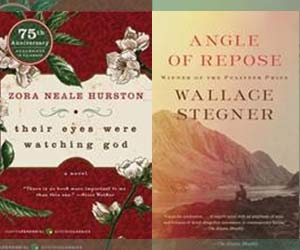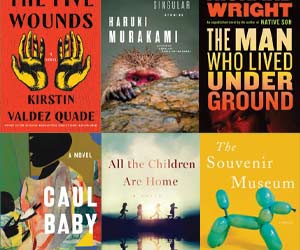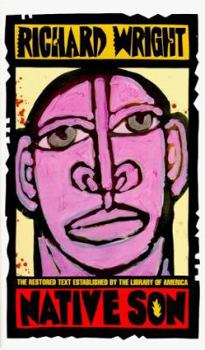Native Son
Select Format
Select Condition 
Book Overview
One of The Atlantic's Great American Novels"If one had to identify the single most influential shaping force in modern Black literary history, one would probably have to point to Wright and the... This description may be from another edition of this product.
Format:Paperback
Language:English
ISBN:0060812494
ISBN13:9780060812492
Release Date:January 1993
Publisher:Harper Perennial
Length:544 Pages
Weight:1.50 lbs.
Dimensions:1.4" x 4.2" x 7.0"
Customer Reviews
6 ratings
One of my favorites
Published by Donna , 5 months ago
Probably one of my favorite books of all time. It made me understand how black Americans had to live and the way the writer portrayed the protagonist was eye opening. I was rooting for him even though he did something heinous. Truly brilliant writing.
If you have never face the true reality of "prejudice, fear, and hate, as a black person in America,
Published by Icha , 3 years ago
This book should be in every school bookshelves. I am not denying that the details of and actions, of the heroïn, are not dramatic. But again that's the daily life of most black Americans in this country. They have been traumatized from birth and on...
Look, see, listen to how this country has been getting worst on the subject...
He Never Had a Chance
Published by Thriftbooks.com User , 17 years ago
"The Native Son" delivers a chilling account of how an ordinary Black American, living in 1930s Chicago, can commit a heinous crime and subsequent cover-up, for the systemic racism and oppression present in America helped to create the conditions in which this horrendous act could occur. "The Native Son", written before the modern Civil Rights movement, does not issue a blanket amnesty for the crimes committed by Blacks, but helps the reader to understand the mindset of a Black living in this oppressed and segregated society where hope abounds only in the afterlife. Although Communists are portrayed sympathetically, this novel is not a call for a "revolution" or blatant propaganda against the "rich." Wright explores racism and its effects, not only on the oppressed, but also on the oppressors. Bigger, the oppressed, fails to see whites as individuals and stereotypes all as racist bigots who intend only to harm him. Of course, there are plenty of these individuals about, yet there are genuine decent whites who Bigger fails to see as human. On the other side, of course, is the systemic abuse of Blacks as they are forced to live into a small section of the South Side in decrepit ghettos. Remarkably, this is a step up from their sharecropping days in the Jim Crow South, where Bigger grew up. However, even those whites who deem themselves to be sympathetic to the "Colored" cause, such as the Daltons, are condescending and arrogant. The Daltons, typical guilty liberals, have contributed thousands to the NAACP, yet they indirectly control the real estate company that reaps the benefits of the segregated society and the artificially higher rents in the black tenements. Even Mary and Jan, who attempt to treat Bigger as an equal, do so in a degrading and condescending manner as they attempt to understand his "people". Indeed, when this large wall of separation is breached, rabid fear is instilled in Bigger, which leads to his acts of murder. Blindness is a recurrent theme throughout, as Mrs. Dalton is literally blind, yet it is the entire society that is blind to the plight of the likes of Bigger Thomas. Of course, Bigger is also blind to the other side and has bred hate and contempt for all whites, even those that do good. Throughout Bigger's journey of self-awareness in prison, he attempts to break through this blindness and to see his purpose in life. Tragically, only as he awaits his final fate does he realize that his white enemies and himself share the same fears and hopes and insecurities. Although the first two-thirds of this novel will leave you spell-bound with its details and its suspense, I was expecting a letdown in the final part of the novel and a rehash of "The Jungle" syndrome, as I'll call it. In "The Jungle", Sinclair provides a scintillating story in the first part of the novel, but this serves only as a pretext to the blatant Socialist propaganda in its final part (no thanks, Mr. Sinclair). And though the last part of
Understanding Native Son
Published by Thriftbooks.com User , 22 years ago
Native Son is perhaps the best book that I have ever read. I can not directly relate to this book, because i have not been exposed to the conditions that are present in this book. However, I can imagine, being an African-American myself, what it was like during the time described in Native Son. In reading this book, I have definately gained an appreciation for the present and for the conditions that I live in. It has also given me a greater apppreciation for literature. Through Native Son, Richard Wright addresses the injustices that African-Americans endured during the 1930's. In reading the book, one must understand that Wright is not trying to portray whites as racist or as villains. He is simply trying to show the graveness of black people's condition and oppression. The purpose of this book is to show the black man's struggle to give meaning to his life despite living in a prejudiced society. He illustrates a troubled man's fear, flight, and fate. Bigger Thomas, the main character, represents the struggle of the black man. He represents the black man that refuses to be tamed by white society. He is an outsider, who, through his "trials" and tribulations, defines his life, finds his place in the world, and establishes his equality. Bigger, however, acheives these goals through violence, because he is surrounded by it; it is all he knows. This character makes up only one of millions of Biggers out their who revolt against the injustices of society. They are the products of American society, and therefore fit their names: "native sons."
A Book to learn from
Published by Thriftbooks.com User , 23 years ago
I recently read Native Son,by Richard Wright, in my 8th grade English class while my class was reading To Kill a Mockingbird. Native Son is the shocking story of a young African American man, Bigger Thomas, living in the "black belt" of Chicago. Every second of his life he encounters the hateful separation society has put between blacks and whites. One night, caught in fear, anger and hate he commits his first murder against the daughter of his employer. Reading the two books simultaneously, I found many interesting comparisons between Native Son and To Kill a Mockingbird. They are both about the trial of a black man. In To Kill a Mockingbird the black man is innocent, however the racist town convicts him. Yet in Native Son he is guilty. Harper Lee tells her story through the point of view of a white person ( she herself is white) yet Richard Wright (a black man) tells the tale through Bigger's eyes. It is interesting to compare the two points of view, telling a similar tale through the two sides of racism. Both authors show their side of the story. Bigger's tale is told in a bigger and more dramatic way than how the whites regard the trial in To Kill a Mockingbird. Both stories portray the separation between African Americans and whites. Reading about this separation in both stories taught me a lot about this countries history. I learned about the strong hate that came between the races and the fear, anger and rage that results from it. The content of Native Son, is not always light. The hideous crimes Bigger commits are hardly small sins, but actions that effect an entire society. Wright's phenomenal writing described the hateful emotion of racism I will never understand. I found it difficult reading such horrible tales of hate, fear and anger. However, I found that reading it helped me to understand a lot of the scandalous society I live in. I learned to what degree racial discrimination of any kind can affect a person. It taught me a lot about issues I don't encounter everyday. I could not honestly say I liked this book; it is not a book one enjoys. It was a book that taught me a lot about our countries history and simple human emotions. I can only say that I am glad I read it, for it was a worthwhile experience. It is a hard book to read, both in language in content, but it shows an account that most likely happened at some time. Its historical aspects teaches the reader not only about racial discrimination but hate, anger and fear. Everyone living in America should read Native Son.
a classic!
Published by Thriftbooks.com User , 24 years ago
Native Son is one of the best books of this century. Richard Wright is one of those rare authors who can dwell into the human psyche of the African-American and provide the reader with a clear understanding of that person's inner turmoil in white America. At first I hated Bigger for commiting those atrocious crimes. I wondered why a person would commit such heinous act when he was offered a chance to rehabilitate himself. But as I read further I came to understand that that Bigger would never become the true person he aspired to be because of those invisible chains that bounded his consciousness. One section depicted Bigger's true feelings:if all our skins were peeled off, blacks and whites would be the same. This book should be a required reading in all middle schools in America.
Native Son Mentions in Our Blog

Summer Reading List: Classics Edition
Published by Ashly Moore Sheldon • June 16, 2021
Are you ready for a reading challenge this summer? We’ve rounded up a list of exceptional classics for you to consider. You could call them the original beach books!

13 Book Releases We're Excited About This Month
Published by Ashly Moore Sheldon • April 02, 2021
Our TBR piles may be weighing down our bedside tables, but that doesn’t stop us from perusing (and purchasing!) new books! Here are fifteen April releases that we can’t wait to pick up, along with suggestions for books you can read right away.





